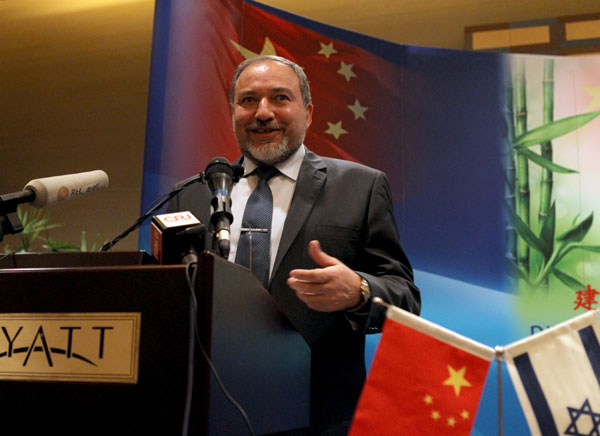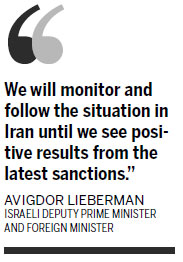Xi urges for peace in the Middle East
Updated: 2012-03-17 10:36
By Cheng Guangjin (China Daily)
|
||||||||
Vice-president hopes for reasonable, comprehensive solution in region
China on Friday called for "comprehensive and long-term" peace between Arab nations and Israel, despite the country's insistence on being open to all options, including military force, against Iran for its nuclear ambitions.
Vice-President Xi Jinping told visiting Israeli Deputy Prime Minister and Foreign Minister Avigdor Lieberman that China believes Israel, Palestine and other Middle East countries should settle disputes and achieve reconciliation through political discussions.
|
 |
|
Avigdor Lieberman, Israeli deputy prime minister and foreign minister, speaks at a news conference in Beijing on Friday. He is on a week-long visit to China, which will also take him to the cities of Chengdu and Shanghai. Feng Yongbin / China Daily |
In a news conference on Friday following meetings with Xi and Foreign Minister Yang Jiechi, Lieberman reiterated Israel's stance that if peaceful talks and sanctions on Iran fail to persuade it to give up its nuclear ambitions, "we will keep all options on table".
|
 |
Israeli Prime Minister Benjamin Netanyahu has warned he will not countenance a long delay in launching an attack on Iran's nuclear sites, according to the BBC. He also linked the rocket fire from Gaza on Thursday to tensions with Iran over its nuclear program, AFP reported.
According to Xinhua, China has always strived for a comprehensive, fair and reasonable solution to conflicts in the Middle East, Xi told Lieberman, who is on a week-long trip to China.
Xi highlighted existing principles and agreements as a foundation for the discussions, including United Nations resolutions, the "Land-for-Peace" principle, the Arab Peace Initiative and the "roadmap for peace" outlined in a 2002 speech by former United States president George W. Bush, Xinhua reported.
Lieberman called Iran the "biggest threat" to not only Israel but also the entire world. He said that despite the sanctions, "we don't see any readiness from the Iranian side to give up their nuclear ambitions to stop uranium enrichment".
He said Israel's concerns are not only over Iranian nuclear ambitions but also "their message and their behaviors are completely unacceptable".
Iranian President Mahmoud Ahmadinejad has publicly said that Israel must be "wiped off the map".
"We will monitor and follow the situation in Iran until we see positive results from the latest sanctions," Lieberman said.
When asked whether he came to China to pressure for more sanctions on Iran, Lieberman said China is a world power and one of the key players in the international arena, so "it's crucial to explain our position to our Chinese partner".
He said he hopes China can understand their concerns and problems and that such Sino-Israeli dialogue will continue.
According to AP, Iran claims its nuclear program is for peaceful purposes. However, Israel and the West believe Teheran is trying to build nuclear weapons.
Israeli leaders have increasingly warned of a possible military strike. The US has said that sanctions and diplomacy must be given more time, AP reported.
The Society for Worldwide Interbank Financial Telecommunication on Thursday announced that it would block 30 Iranian banks from its global network, AP said.
This makes it difficult for Iran to make international money transfers and will likely hurt its vital oil trade, AP reported.
According to AFP, two Israeli naval vessels passed through Egypt's Suez Canal on Tuesday, headed from the Mediterranean to the Red Sea.
In January, an Iranian nuclear scientist from Iran's Natanz uranium enrichment site was killed, which Iranian officials accused Israel of responsibility, according to the New York Times.
Yin Zhuo, a retired navy rear admiral, told CCTV in an interview that if Iran possessed nuclear weapons, it will be a "life or death" crisis for Israel, which is a small country that cannot stand such attacks.
However, he added that Israel understands that it's hard to initiate a war against Iran all by itself, which will affect the strategic interests of the US, its important ally.
"Once a war begins, it will not stop at the destruction of Iran's nuclear sites. Israel's own security, how long and in what way Iran will retaliate, and whether Israel's allies will still stand by its side, are all issues that Israel should consider before taking the move," Yin said.
chengguangjin@chinadaily.com.cn

 Relief reaches isolated village
Relief reaches isolated village
 Rainfall poses new threats to quake-hit region
Rainfall poses new threats to quake-hit region
 Funerals begin for Boston bombing victims
Funerals begin for Boston bombing victims
 Quake takeaway from China's Air Force
Quake takeaway from China's Air Force
 Obama celebrates young inventors at science fair
Obama celebrates young inventors at science fair
 Earth Day marked around the world
Earth Day marked around the world
 Volunteer team helping students find sense of normalcy
Volunteer team helping students find sense of normalcy
 Ethnic groups quick to join rescue efforts
Ethnic groups quick to join rescue efforts
Most Viewed
Economy on path of steady growth[1]|chinadaily.com.cn
Gay sex poses HIV threat for youth|Society|chinadaily.com.cn
Japan to release videos of Chinese activists|Asia-Pacific|chinadaily.com.cn
Gay sex blamed for rise in young students with HIV/AIDS|Society|chinadaily.com.cn
More young adults living with parents|Americas|chinadaily.com.cn
Magazine seeks Guangzhou expat families to tour Fujian[1]|chinadaily.com.cn
World's longest sightseeing escalator awaits you in Central China[4]|chinadaily.com.cn
Dai Ethnic Group[1]|chinadaily.com.cn
Minmetals unit offers sponge city solutions for rainfall usage|Business|chinadaily.com.cn
Licenses revoked in anti-porn campaign|Society|chinadaily.com.cn
Editor's Picks

|

|

|

|

|

|
Today's Top News
Health new priority for quake zone
Xi meets US top military officer
Japan's boats driven out of Diaoyu
China mulls online shopping legislation
Bird flu death toll rises to 22
Putin appoints new ambassador to China
Japanese ships blocked from Diaoyu Islands
Inspired by Guan, more Chinese pick up golf
US Weekly

|

|







